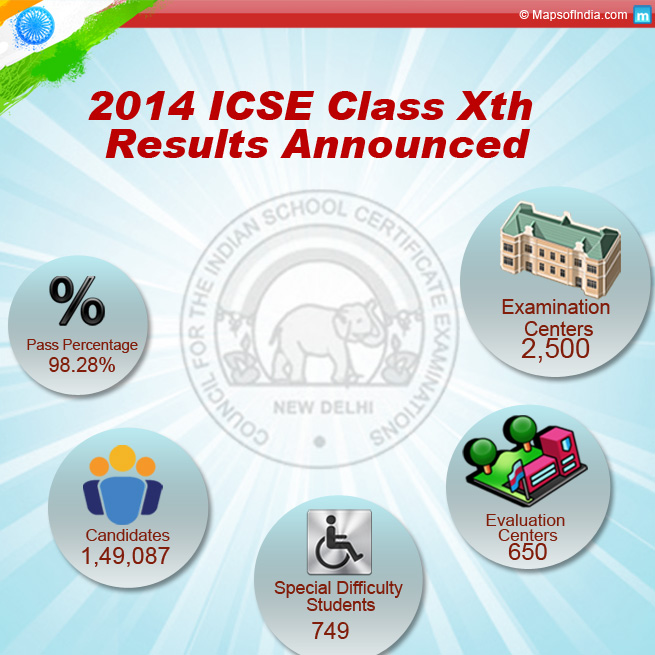The Council for the Indian School Certificate Examination (CISCE) has announced today the 2014 Indian Certificate for Secondary Examination (ICSE) for Class Xth results.
The major highlights of this year’s examination are:
- Pass Percentage: 98.28%
- Number of Candidates: 1,49,087
- Special Difficulty Students: 749
- Total Examination Centers: 2,500
- Total Evaluation Centers: 650
In 2013, the ICSE region-wise pass percentages recorded were:
- Southern region: 99.66%
- Western region: 99.46%
- Eastern region: 98.02%
- Northern region: 97.30%
The CISCE is a private, non-governmental Board of school education in India that was set up in 1956 and is head quartered in New Delhi. CISCE conducts the ICSE examination for Class Xth and the ISC examination for Class XII.
The ICSE is a K-10 Public Board examination for students who have completed the class X. Students in this class have the following subject choice:
Seven subjects are to be taken up, of which four are compulsory and three have a choice of subjects.
Compulsory subjects: English, Environmental Education and SUPW (Socially Useful Productive Work)
Students have to choose 3 to 5 subjects from the following:
- One Indian language
- One Foreign language
- One Classical language
- English Literature
- Commerce
- Economics
- Accounts
- Business Studies
- Geography
- Psychology
- Sociology
- History
- Civics
- Political Science
- Physics
- Chemistry
- Biology
- Mathematics
- Electricity and Electronics
- Engineering Science
- Computer Science
- Geometrical and Mechanical Drawing
- Geometrical and Building Drawing
- Environmental Science
- Biotechnology
- Home Science
- Fashion Designing
- Physical Education
General Perception of CISCE system vs CBSE system
Both Boards have their advantages and areas of focus. The CBSE system has more schools affiliated to it and therefore the choice of schools is greater when a student relocates to another city within India.
The CISCE is generally perceived as being tougher than CBSE system with the marking criteria tougher than the CBSE. This is the reason that students under the CBSE system tend to score higher percentage marks when compared to CISCE students. In fact, several universities and educational institutions offer additional mark weightage to students of the CISCE system to compensate the marking differential with the CBSE students, when evaluating students for admissions.
The CBSE system is more suited for students keen on appearing for competitive examinations like IIT-JEE, All India Engineering Entrance Examination (AIEEE) and the All India Pre Medical Test (AIPMT), as the exam content relies on the CBSE content.
However, the CISCE system offers a comprehensive approach to learning that encourages understanding and application of concepts. It also encourages learning and development in a detailed manner and offers a wide subject mix for learning based on interest and aptitude of the student.
The CBSE system is more focused on the theoretical side of learning and is perceived to be relatively easier than the CISCE syllabus.




